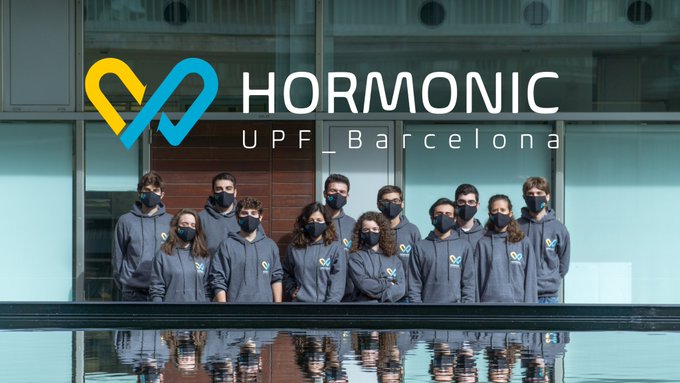Excellent results by the team of UPF students at the iGEM synthetic biology competition
Excellent results by the team of UPF students at the iGEM synthetic biology competition
Students on the bachelor’s degree in Biomedical Engineering have developed the project HORMONIC, an approach to treating hypothyroidism. It seeks to achieve an artificial balance of the thyroid hormone, detecting the amount and regulating it as the body itself would.

The group of Biomedical Engineering students at UPF, with its project HORMONIC, which focuses on treating hypothyroidism, has obtained a gold medal at the Giant Jamboree, the annual event that closes the iGEM (International Genetically Engineered Machine) international synthetic biology competition. In addition to the gold medal, which recognizes excellence in several areas, they have earned recognition for best "wiki" (the web page where they present their work) and best "basic part" (a unit of functional DNA that can be used by the iGEM community to create new devices) and have been nominated for best therapeutic project, poster and presentation video. Due to the pandemic, the competition was held online from 13 to 22 November.
iGEM Barcelona is the only team from Spain to have entered the competition this year. The team is made up of the students Andreu Pascuet, Eduard Suñé, Jan Pinyol, Jaume Puig, June Monge, Marcos Chic, Miriam Caravaca, Nerea Alvarez de Eulate, Quim Martí and Tomas Berjaga.
Hypothyroidism is a condition characterized by the lack of thyroid hormone which affects 1 out of 10 Spaniards. Currently, patients suffering from hypothyroidism are prescribed with synthetic thyroid hormones. But the range of doses at which the drug is effective without adverse effects is quite narrow, and one-third of the treated patients still present symptoms.
Under normal conditions, thyroid hormones are kept under control by inhibiting the secretion of hormones when they are at an adequate level. Project HORMONIC seeks to achieve an artificial thyroid balance, detecting the amount of hormone and regulating it as the body itself would.
By compiling recent advances in synthetic biology, computation and electronics, they intend to offer a patient-specific solution for determining the administration of the necessary dose of drugs.
The proposal of the iGEM Barcelona team is based on three stages. First, to detect the amount of thyroid hormone in the body using a biosensor formed by a modified bacterium that gives a fluorescent response proportional to the amount detected. Next, an electronic circuit implements the response to be given and finally, a system delivers the hormone if required. Thus, the release of the drug is controlled continuously.
“By compiling recent advances in synthetic biology, computation and electronics, we intend to offer a patient-specific solution for determining the administration of the necessary dose of drugs”, the team explains. “We finally chose to develop this project because the multidisciplinary character of our team perfectly matched the needs that this therapeutic approach appeared to have”.
They have prepared a website, a promotional video, and a video of their project presentation. The group has had the support of the University Board of Trustees and the Departments of Experimental and Health Sciences (DCEXS) and Information and Communication Technologies (DTIC). Its advisors are Marc Güell, Avencia Sanchez-Mejías, Dimitrije Ivančić, and Sira Mogas.
iGEM competition
The iGEM competition is a synthetic biology competition in which students have to design and build innovative and sophisticated genetic engineering systems. The objective of this initiative is for multidisciplinary teams to design, build, and evaluate a system using interchangeable biological parts and molecular biology techniques, to solve current problems.
It began in January 2003 as an independent study course at the Massachusetts Institute of Technology (MIT). The course became a 5-team summer contest in 2004 and continued to grow to 45 countries and nearly 6,000 participants.
Results of the 2020 edition.
